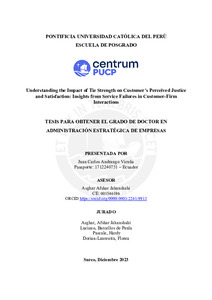| dc.contributor.advisor | Afshar Jahanshahi, Asghar | |
| dc.contributor.author | Andrango Vicuña, Juan Carlos | |
| dc.date.accessioned | 2024-01-15T15:07:40Z | |
| dc.date.available | 2024-01-15T15:07:40Z | |
| dc.date.created | 2023 | |
| dc.date.issued | 2024-01-15 | |
| dc.identifier.uri | http://hdl.handle.net/20.500.12404/26792 | |
| dc.description.abstract | La frecuente interacción entre clientes y empresas genera vínculos entre ellos, que pueden
verse perjudicados por fallas en el servicio, ya que las organizaciones no están exentas de
tales escenarios. Utilizando datos basados en encuestas de 348 clientes ecuatorianos con
experiencia en fallas en el servicio, esta investigación tiene como objetivo demostrar el
efecto moderador de la fuerza del vínculo (alta versus baja) en la relación entre las
dimensiones de justicia percibida y la queja y la satisfacción acumulada, ampliando así
nuestra comprensión de Teoría de la justicia y marketing relacional. Esta investigación tiene
un enfoque cuantitativo, método PLS-SEM. Los resultados revelan que cuando el vínculo
del cliente con la empresa es fuerte (frente a débil), el efecto moderador influye en la
relación entre la percepción de justicia distributiva y la satisfacción acumulativa. Además,
bajo la influencia de vínculos fuertes, se fortalece la relación entre la justicia distributiva e
interaccional y la satisfacción de las quejas. Por el contrario, los bajos niveles de vinculación
afectan las evaluaciones de los procesos y procedimientos de recuperación, así como el
manejo de quejas sobre tiempos y rapidez implementados por las empresas, sin lograr un
impacto en el comportamiento de los clientes. Estos hallazgos tienen implicaciones
importantes, ya que resaltan la necesidad de que los gerentes consideren el tipo de relación
con los clientes existentes al diseñar e implementar estrategias de recuperación.
La fuerza del vínculo da luz para comprender mejor el funcionamiento de las relaciones
comerciales, y consolida el vínculo entre cliente-empresa, aumentando la satisfacción de
las quejas del consumidor (mediante la justicia procesal e interaccional) y la satisfacción
acumulativa (mediante la justicia distributiva). | es_ES |
| dc.description.abstract | The frequent interaction between customers and firms generates tie strength among them, which
may be impaired due to service failures, as organizations are not exempt from such scenarios.
With using survey-based data from 348 Ecuadorian costumers with service failure experience,
this research aims to demonstrate the moderating effect of tie strength (high vs. low) on the
relationship between perceived justice dimensions and complaint and cumulative satisfaction,
thus extending our understanding of justice theory and relationship marketing. This research
has a quantitative approach, PLS-SEM method. The results reveal that when the customer's tie
strength to the firm is strong (vs. weak), the moderating effect influences the relationship
between distributive justice perception and cumulative satisfaction. Additionally, under the
influence of strong ties, the relationship between both distributive and interactional justice and
complaint satisfaction is strengthened. On the contrary, low levels of ties affect the evaluations
of the recovery processes and procedures, as well as the handling of complaints regarding time
and speed implemented by firms, without achieving an impact on customer behavior. These
findings have important implications, as they highlight the need for managers to consider the
type of relationship with existing customers when designing and implementing recovery
strategies. Tie strength gives light to better understand the functioning of commercial
relationships, and cementing the link between customer -firm, increasing consumer complaint
satisfaction (by means of procedural and interactional justice) and cumulative satisfaction
(through distributive justice). | es_ES |
| dc.language.iso | eng | es_ES |
| dc.publisher | Pontificia Universidad Católica del Perú | es_ES |
| dc.rights | info:eu-repo/semantics/closedAccess | es_ES |
| dc.rights.uri | http://creativecommons.org/licenses/by-nc-nd/2.5/pe/ | * |
| dc.subject | Servicios al cliente--Calidad | es_ES |
| dc.subject | Satisfacción del cliente | es_ES |
| dc.title | Understanding the impact of tie strength on customer’s perceived justice and satisfaction: insights from service failures in customer-firm interactions | es_ES |
| dc.type | info:eu-repo/semantics/doctoralThesis | es_ES |
| thesis.degree.name | Doctor en Administración Estratégica de Empresas | es_ES |
| thesis.degree.level | Doctorado | es_ES |
| thesis.degree.grantor | Pontificia Universidad Católica del Perú. CENTRUM | es_ES |
| thesis.degree.discipline | Administración Estratégica de Empresas | es_ES |
| renati.advisor.cext | 001546196 | |
| renati.advisor.orcid | https://orcid.org/0000-0003-2241-9913 | es_ES |
| renati.author.pasaporte | 1712240751 | |
| renati.discipline | 413038 | es_ES |
| renati.juror | Afshar Jahanshahi, Asghar | es_ES |
| renati.juror | Barcellos de Paula, Luciano | es_ES |
| renati.juror | Hardy, Pascale | es_ES |
| renati.juror | Florea, Dorian-Laurentiu | es_ES |
| renati.level | https://purl.org/pe-repo/renati/level#doctor | es_ES |
| renati.type | https://purl.org/pe-repo/renati/type#tesis | es_ES |
| dc.publisher.country | PE | es_ES |
| dc.subject.ocde | https://purl.org/pe-repo/ocde/ford#5.02.04 | es_ES |







